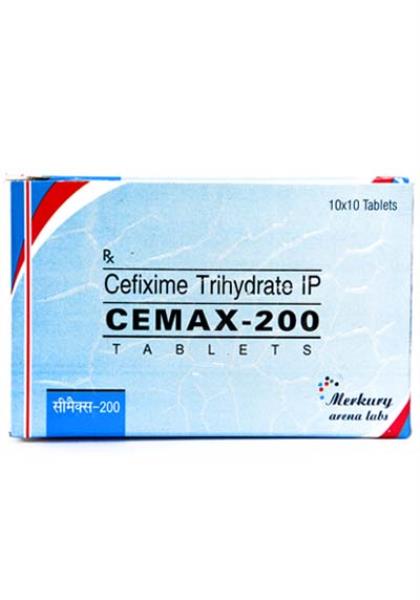Setting Standards Across the Pharma Value Chain

Uses
Cefixime is used to treat a wide variety of bacterial infections. This medication is known as a cephalosporin antibiotic. It works by stopping the growth of bacteria.
This antibiotic treats only bacterial infections. It will not work for viral infections (e.g., common cold, flu). Unnecessary use or overuse of any antibiotic can lead to its decreased effectiveness.
How to use Cefixime Tablet:
Take this medication by mouth with or without food as directed by your doctor, usually once a day. In children, this medication may also be taken twice a day (every 12 hours). If you are taking the chewable tablets, chew thoroughly and then swallow.
The dosage is based on your medical condition and response to treatment. In children, the dosage is also based on weight.
For the best effect, take this antibiotic at evenly spaced times. To help you remember, take this medication at the same time(s) every day.
Continue to use this medication until the full prescribed amount is finished, even if symptoms disappear after a few days. Stopping the medication too early may allow bacteria to continue to grow, which may result in a relapse of the infection.
Tell your doctor if your condition persists or worsens.
Side Effects:
Stomach upset/pain, diarrhea, nausea, gas, headache, or dizziness may occur. If any of these effects persist or worsen, notify your doctor or pharmacist promptly.
Remember that your doctor has prescribed this medication because he or she has judged that the benefit to you is greater than the risk of side effects. Many people using this medication donot have serious side effects.
Tell your doctor right away if any of these rare but very serious side effects occur: severe stomach/abdominal pain, persistent nausea/vomiting, yellowing eyes/skin, dark urine, unusual tiredness, new signs of infection (e.g., persistent sore throat, fever), easy bruising/bleeding, signs of kidney problems (such as change in the amount of urine), mental/mood changes (such as confusion).
This medication may rarely cause a severe intestinal condition (Clostridium difficile-associated diarrhea) due to a resistant bacteria. This condition may occur weeks to months after treatment has stopped. Do not use anti-diarrhea products or narcotic pain medications if you have the following symptoms because these products may make them worse. Tell your doctor right away if you develop: persistent diarrhea, abdominal or stomach pain/cramping, or blood/mucus in your stool.
Use of this medication for prolonged or repeated periods may result in oral thrush or a new vaginal yeast infection (oral or vaginal fungal infection). Contact your doctor if you notice white patches in your mouth, a change in vaginal discharge, or other new symptoms.
A very serious allergic reaction to this drug is rare. However, get medical help right away if you notice any symptoms of a serious allergic reaction, including: rash, itching/swelling (especially of the face/tongue/throat), severe dizziness, trouble breathing.
This is not a complete list of possible side effects. If you notice other effects not listed above, contact your doctor or pharmacist.
Precautions:
Before taking cefixime, tell your doctor or pharmacist if you are allergic to it; or to penicillins or other cephalosporin antibiotics (e.g., cephalexin); or if you have any other allergies. This product may contain inactive ingredients, which can cause allergic reactions or other problems. Talk to your pharmacist for more details.
Before using this medication, tell your doctor or pharmacist your medical history, especially of: kidney disease, a certain intestinal disease (colitis).
Cefixime may cause live bacterial vaccines (such as typhoid vaccine) to not work as well. Do not have any immunizations/vaccinations while using this medication unless your doctor tells you to.
Before having surgery, tell your doctor or dentist about all the products you use (including prescription drugs, nonprescription drugs, and herbal products).
The chewable form of this medication may contain aspartame. If you have phenylketonuria (PKU) or any other condition that requires you to limit/avoid aspartame (or phenylalanine) in your diet, ask your doctor or pharmacist about using this medication safely.
This medication should be used only when clearly needed during pregnancy. Discuss the risks and benefits with your doctor.
It is unknown if this medication passes into breast milk. Consult your doctor before breast-feeding.